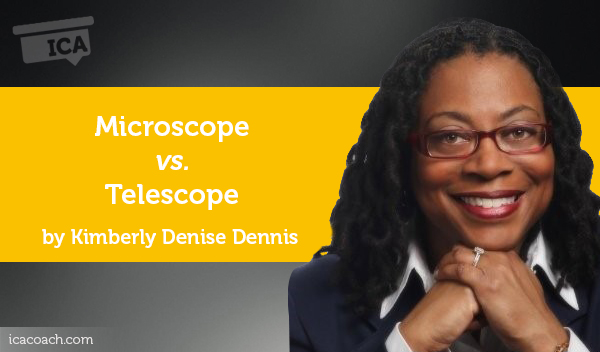
A Coaching Power Tool Created by Kimberly Denise Dennis
(Life Coach, UNITED STATES )
If you do not raise your eyes you will think that you are the highest point.~Antonio Porchia
Kathryn is under a lot of stress. She has been putting in extra hours at work every day for the last month to complete a project by her self-imposed deadline. She doesn’t really like the work she is doing, but she likes the money she earns and it gives her the chance to live a comfortable lifestyle. She can afford to travel, take her daughter to the theater, and spend a day at the spa. She can afford it all, but never does any of it, because there is always a project and a deadline that needs to be met.
Too many of us are like Kathryn, hyper-focused on what is directly in front of us and ignoring the bigger picture. Often, we recognize the symptoms—e.g., the stress—but don’t realize we are missing the underlying cause. In this case, Kathryn is so consumed with her work and making money that she doesn’t even notice that she is not taking out time to enjoy her life!
Kathryn, like so many of us, is looking at her life through a microscope instead of a telescope.
Microscope vs. Telescope
When we approach life through the “microscope” perspective, we focus on our current situation and tasks without seeing or understanding how today’s tasks relate to the bigger picture of our lives.
Microscopic thinkers tend to:
We must learn to look at life through a telescope, allowing us to view the bigger picture and far into the future.
Telescopic thinkers tend to:
We do not need to completely switch from the microscope to the telescope. Instead, we need to master the art of switching back and forth from microscope to telescope. The ideal is to know that both tools exist and to know when to use each perspective.
Self Application
When you find that you are feeling stuck, stressed, or simply not making progress, it may be time to switch from a microscope to a telescope. How is what you are currently doing related to your big picture? What impact will your current challenges have on your future self? In what way(s) might current obstacles signal that you are moving away from your long-term goals?
When envisioning your ideal future, be sure to consider the microscope perspective. Given where you see yourself in 20 years, what should you be focused on today? What milestones will you need to accomplish in order to move closer to your ideal life?
Since both perspectives can be beneficial, your goal should be to seek out the right mix of short-term (microscope) and long-term (telescope) thinking. You need to develop a balance between strategic thinking and the little things that need to be done to ensure that the big picture vision is properly executed.
Coaching Application
As a coach, is it valuable to consider the telescope (strategic thinking) and microscope (operations/tactical thinking) when asking clients questions. For example, when coaching a business owner client, you As a business owner, you may want to ask questions about the big picture: where is the business headed? What is your vision for your company? As well as asking questions about the details of the business, such as clients, products and services. Of course, the goal is not to be a consultant for the client. The goal is simply to help the client shift perspectives if they are only expressing one point of view. With a life coaching client, the coach might work with a client to explore and overcome specific challenges, but may also want to encourage the client to take an imaginary step back, and understand the role that those current challenges play in the larger arena of life.
In general, the microscopic perspective focuses on doing, while the telescopic perspective focuses on thinking. Both coach and client need to know when to stop and think and when to move forward.
Reflection
- Which is more natural for you: the microscope or the telescope?
- What are your long term goals?
- How will your current actions bring you closer to your vision?
- How can you strike a balance between thinking (telescope) and doing (microscope)?
- How can the microscopic perspective help you in your current situation?
- How can the telescopic perspective help you in your current situation?
- Where do you see yourself 20 years from now?
- How is your current path leading you to your ultimate goals?
- What investments in yourself do you need to make today to gain a better outcome tomorrow?
- Are you being busy or being effective?
- How are you developing the knowledge, skills, and/or abilities you may need later in life?